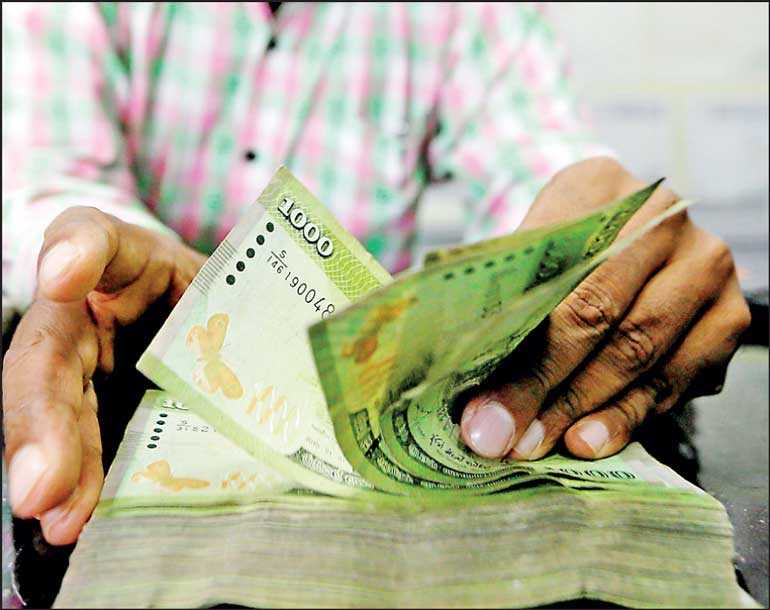Wednesday Feb 25, 2026
Wednesday Feb 25, 2026
Friday, 19 March 2021 00:00 - - {{hitsCtrl.values.hits}}

Rupee depreciation triggered a multi-pronged policy response from the Central Bank yesterday
By Uditha Jayasinghe and Asiri Fernando
Government and main Opposition politicians traded points over rupee depreciation yesterday, in the backdrop of the Central Bank suspending the requirement for licensed banks to sell 10% of worker remittances and 50% of export earnings to the monetary authority and stopping the purchase of Sri Lanka Development Bonds as part of a multi-pronged effort to stabilise the currency.
Issuing two circulars on Wednesday, the Central Bank suspended the requirement imposed last month making it mandatory for licensed commercial banks to sell 10% of converted worker remittances to the monetary authority. It did the same for the regulation requiring 50% of export earnings to be sold to the Central Bank.
Both suspensions will be implemented until further notice. On Thursday, an additional circular informed licensed commercial banks and National Savings Bank to suspend the purchase of Sri Lanka International Sovereign Bonds with effect from 23 March until 9 April.
“The Central Bank of Sri Lanka with a view to easing pressure on the exchange rate and considering the substantial amount of possible/potential outflow of foreign exchange by banks and its impact on banks’ risk management, licensed commercial banks and National Savings Bank are hereby informed to suspend the purchase of Sri Lanka International Sovereign Bonds with effect from 23 March 2021 until 09 April 2021,” a directive issued by the Governor of the Central Bank said.
The Central Bank had earlier said the rupee recorded a depreciation of 4.9% against the dollar till 10 March. But that was exacerbated this week after the rupee closed at Rs. 202/203 to the dollar in the one-week forward market on Wednesday. It managed to do slightly better yesterday closing at 198.50/199 levels, according to dealers. The bond yields remained unchanged.
Weighing in on the depreciation issue yesterday, State Minister for Money, Capital Markets and State Enterprise Reforms Ajith Nivard Cabraal was confident fresh forex flows are around the corner and backed Government policies for creating the right environment to attract them.
“The right #policies are now in place for non-debt #forex inflows. It’s only a matter of time before the #Rupee appreciation process starts. #Businesses and #industries must prepare for that transformation. @CBSL #SriLanka #debt #GOSL #economicrecoveryplan,” the State Minister tweeted.
However, there was a swift rebuttal from Samagi Jana Balawegaya (SJB) and former State Minister of Finance Eran Wickramaratne, who faulted the Government for triggering depreciation by increasing market liquidity levels. He also pointed out that market sentiment was low due to fast shrinking reserves, which the Government had so far failed to boost and warned that unless more clarity is provided on debt sustainability, the rupee could continue its decline. Sri Lanka’s reserves reached $ 4.5 billion in February.
Wickramaratne criticised the Government for pushing the Central Bank to purchase large amounts of Government Securities to finance a high Budget deficit, resulting in the release of Rs. 700 billion into the market. He argued that this high a level of liquidity was causing the rupee to depreciate. The Central Bank has maintained a contradictory stance, pointing out that due to import restrictions, especially on vehicles, demand is being kept subdued and liquidity was not driving depletion of reserves.
“There is a big problem with policy making and management of the economy,” Wickramaratne told reporters at a press conference. “The continuation of the Government’s current fiscal policy will lead to a greater crisis. Printing money is one thing. But if debt servicing is not done properly, it will be disastrous for Sri Lanka.
“The 17 March treasury bond auction is a good example. There wasn’t a demand for Treasury Bills even with a three-month maturity. This is the state of affairs.”
Analysts who spoke to the Daily FT acknowledged pinning down the exact reason for rupee depreciation was tricky but conceded that market sentiment could be under additional pressure due to two large debt repayments in May and July. On 1 May the Central Bank will have to settle an estimated $ 670 million in Sri Lanka Development Bonds, about half what is due for the year. This will be closely followed by a $ 1 billion bond repayment in mid-July.
“With limited reserves investors are concerned about how these repayments will be met. This is a key question asked by many foreign investors who call us. Exports also tend to be lower in April due to New Year holidays, and imports tend to increase ahead of the festival period, sometimes creating currency pressures. But these dynamics may have changed due to the pandemic,” opined ICRA Lanka Head of Research and Business Development Lalinda Sugathadasa.
“It is hard to give a specific reason, but sentiment definitely plays a huge role.”
Analysts also agreed that a significant inflow of forex is needed to reverse depreciation but suggested that the recent $ 1.5 billion swap with China was unlikely to meet this requirement as it was a local currency facility and not a dollar one.
“Since the swap is in Yuan the Government can likely only draw down to pay import bills. This is useful since China is one of our biggest import destinations with Sri Lanka regularly importing about $ 3.5-4 billion in goods. But it will not top up reserves and that is what Sri Lanka really needs,” a well-known economist told Daily FT on conditions of anonymity.
So far, the Central Bank’s active intervention in the domestic foreign exchange market through supply of foreign exchange and sell/buy swaps with local commercial banks has contributed to enhancing the foreign exchange liquidity in the market. The monetary authority supplied $ 72 million, on a net basis, to the domestic foreign exchange market in January.